Benefactors: Donate to UC Davis Cancer Center Expansion Fund
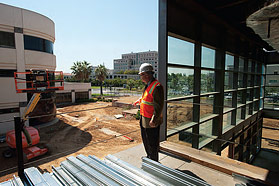
The dual roles are a modern necessity for deVere White, director of the UC Davis Cancer Center. With federal funding tight and the UC Davis Health System budget strained by innumerable demands in an ailing economy, he constantly courts donors to fund research, endowments and other needs. His most critical mission at the moment: raising money to complete the 46,000-square-foot Cancer Center expansion.
"We understand that these are difficult financial times, but the UC Davis Cancer Center is one of the region’s world-class amenities, and it needs to be supported by the community," deVere White says. "We have earned this support through our record of research and patient care, and we want to make sure we continue earning it every day."
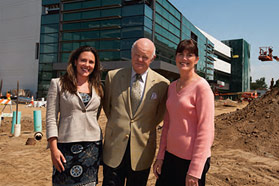
Connected to the original center on X Street by a second-floor bridge, the long-awaited addition will create much-needed clinical and research space and help the center keep pace with its rapidly growing patient load. Patient volume has jumped 55 percent since 2002, and the center has been forced to operate a satellite clinic to deal with the growth, says Jeanine Stiles, the center’s chief administrative officer.
"This new building will allow us to accommodate everyone in one location, reducing patient stress overall and bringing pediatric oncology together with adult oncology," Stiles says.
As of September of this year, through a combination of UC Davis Health System and philanthropic funds, the cancer center had secured $18.5 million for the expansion. An impressive cadre of benefactors have given to the building campaign, contributing from $5 to the $5 million donated by the Wayne and Gladys Valley Foundation.
The UC Davis Cancer Center is one of just 65 centers nationally to receive designation by the National Cancer Institute.
Among those who have responded generously to the center’s needs is Barbara Fingerut, who gave $30,000 on behalf of her late husband to finance the addition’s two infusion rooms, in addition to $335,000 for student scholarships and a $1.5 million bequest for cancer research. Stanley Fingerut died 10 years ago after a battle with multiple myeloma, and his wife continues to heap praise on the cancer center for the treatment he received there.
"I think it’s outstanding," says Fingerut, a breast cancer survivor with a long history of philanthropic support for the center. "People think the government pays for everything, but they can only do so much. We in the community need to come forward and contribute if we want this excellent care to continue."
Despite the progress, the Cancer Center needs $9 million more to cover construction costs of the addition, scheduled to open in July of 2012.
Kelly Ciotti, the cancer center’s development officer, is optimistic because prospective donors know that the new building means much more than just extra square footage.
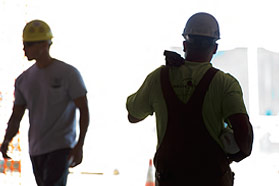
"One key value of the new space is that by bringing everyone under one roof, it will allow for heightened collaboration among our cancer specialists," Ciotti says. "That will expedite the translation of scientific breakthroughs into the most effective patient care and ultimately help give us what everyone wants – more cancer survivors."
In these days of falling stock prices, eroded property values and persistent economic jitters, raising money has become increasingly challenging for health-care organizations and other nonprofit causes. The Cancer Center is no exception.
That’s why benefactors are turning to creative – and financially feasible – means of supporting the expansion project, all of which carry tax benefits. Naming opportunities, which can be achieved in numerous ways, are one example.
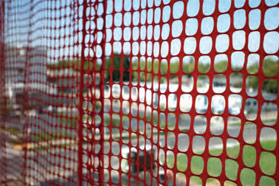
Naming opportunities commemorate a donor’s generosity, tying their name in perpetuity to an institution they hold in esteem. Naming gifts also inspire others to donate and help with recruitment and retention of world-class faculty who recognize that the institution has gained community support. They also lend prestige to an institution. The most acclaimed cancer centers in the country are named by their most philanthropic donors.
For the Cancer Center expansion, naming opportunities range from the donor wall ($5,000, or $83.33 a month for five years) to an exam room ($25,000) and the pediatric floor ($5 million), and beyond.
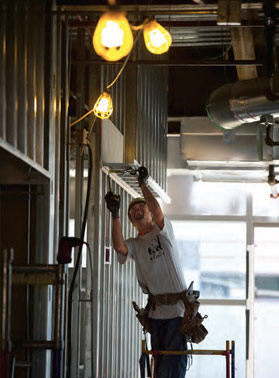
Donors can enjoy a naming opportunity or simply make a gift to leave a legacy through:
- Multi-year pledges that enable more generous gifts than might be possible through a single contribution. These pledges may be paid over five years in annual, semiannual or quarterly installments, with payments to begin at the donor’s convenience.
- Tribute and memorial gifts. These are a meaningful and lasting way to pay tribute to a loved one or a health-care provider.
- Real estate donations. Property can be donated outright, or placed in a trust or given through a will. Such contributions enable donors to enjoy personal financial benefits while supporting the Cancer Center’s work in a meaningful way.
- Gifts of securities – stocks, mutual funds or bonds.
- Naming the UC Davis Cancer Center as a beneficiary in a life insurance policy. This avenue of giving is practical, simple, and a powerful vehicle for helping the center.
- Matching corporate gifts. Many companies sponsor matching gift programs that amplify the impact of their employees’ personal contributions without increasing the obligation of the individual donor.
The UC Davis Cancer Center is one of just 65 centers nationally to receive designation by the National Cancer Institute. Since first winning that honor in 2001, the center’s research funding has more than doubled – from $45 million to $107 million – and it now treats more than 9,000 adult and pediatric patients annually. In a recent ranking of 900 cancer programs across the country, U.S. News & World Report recognized the UC Davis Cancer Center as 39th in the nation.
"We in the community need to come forward and contribute if we want this excellent care to continue."
Success has brought an onslaught of new patients, who travel to the center from as far south as Fresno and as far north as the Oregon border. Outpatient visits to the center have increased steadily, by about 6 percent a year, and the need for cancer treatment is increasing as the region’s population grows and ages, and as new methods of cancer diagnosis and treatment become available.
The existing Cancer Center was built in 1991 and originally spanned 56,000 square feet. In 2005, a $10-million expansion added another 7,000 square feet to the radiation oncology clinic on the ground floor. Various projects and partnerships outside Sacramento, in Roseville and Marysville, for example, have also helped ease space demands. But it has not been nearly enough.
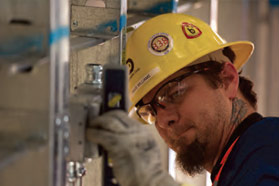
The expansion will particularly benefit pediatric and adolescent patients. Locating young and old patients together will boost the emotional well-being of both age groups, and enhance the team approach that is so beneficial to cancer treatment.
"Children tend to go through their cancer treatment very bravely, and having that positive spirit around can provide hope and a valuable perspective to older patients," deVere White says.
On the research front, the new space will enable UC Davis to more easily host clinical trials that can boost access for patients to new, potentially life-saving cancer drugs. The Cancer Center currently lacks needed dedicated space for clinical trials work.

The expansion also includes the remodeling of 9,000 square feet of the existing center, bringing new carpeting and paint to the building and refurbishing clinical laboratories as well as the waiting room and registration areas.
While $9 million is a sizeable number, those in the fundraising trenches remain hopeful because they have a product whose value is indisputable.
Locating young and old patients together will boost the emotional well-being of both age groups, and enhance the team approach that is so beneficial to cancer treatment.
"The Cancer Center’s accomplishments speak for themselves, and I frequently meet cancer survivors who want to express their thanks by donating," says Ciotti. "We are confident that our grateful patients, their families and those who simply want to help advance cancer care will step forward to help make our vision a reality."



 Wayne and Jacque Bartholomew, both alumni and long-time supporters of UC Davis, included the Cancer Center and other medical center departments in their estate planning a number of years ago. Jacque has received treatment at the Cancer Center, along with other family members. "We feel good about giving back to the cancer center in terms of helping and making people aware that the center needs support," Wayne says. "People need to appreciate the process that will help the university continue to move forward, which will then raise the whole health care delivery system in our community."
Wayne and Jacque Bartholomew, both alumni and long-time supporters of UC Davis, included the Cancer Center and other medical center departments in their estate planning a number of years ago. Jacque has received treatment at the Cancer Center, along with other family members. "We feel good about giving back to the cancer center in terms of helping and making people aware that the center needs support," Wayne says. "People need to appreciate the process that will help the university continue to move forward, which will then raise the whole health care delivery system in our community."



